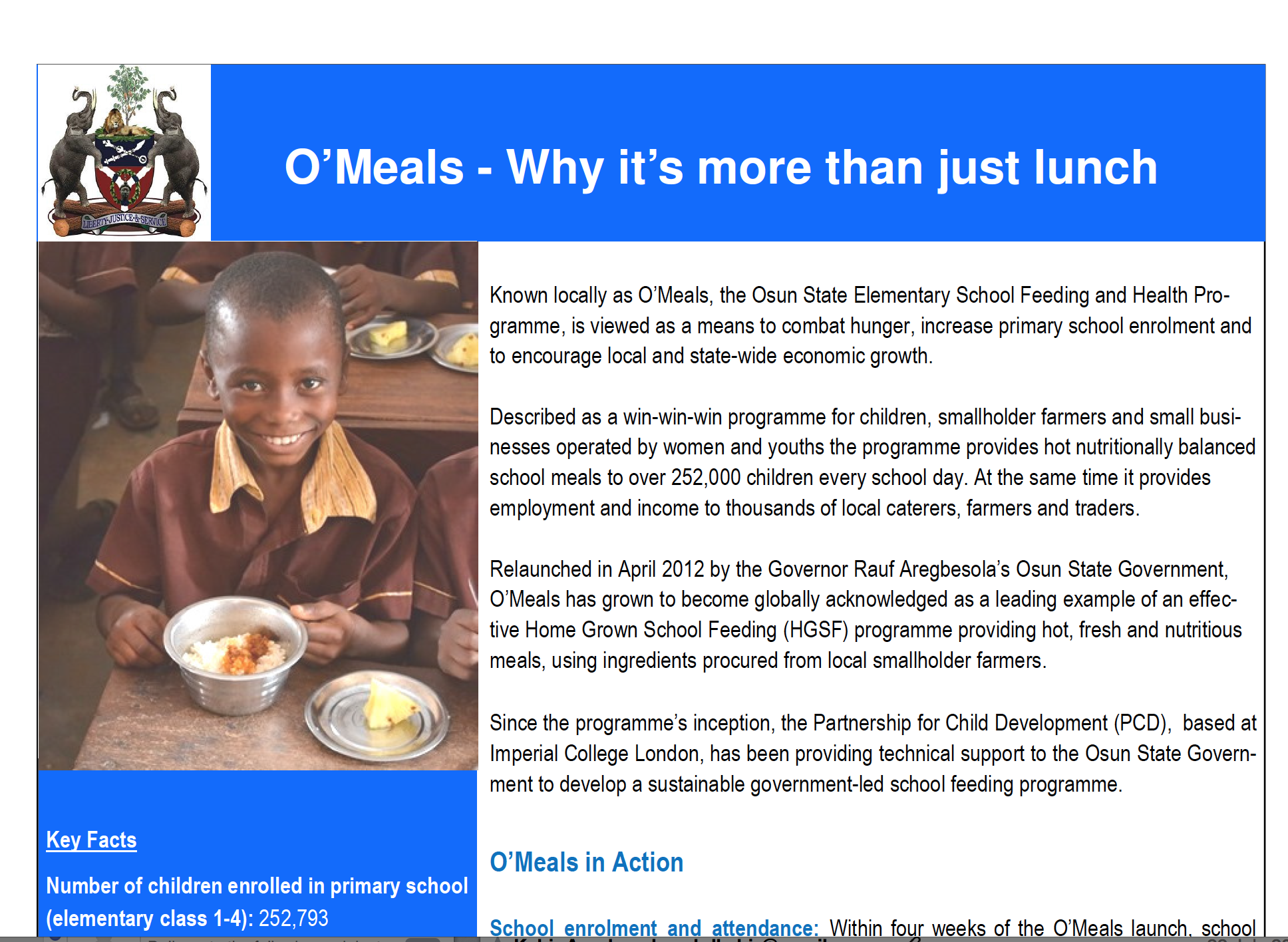
O’Meals – Why It’s More Than Just Lunch
 Known locally as O’Meals, the Osun State Elementary School Feeding and Health Programme, is viewed as a means to combat hunger, increase primary school enrolment and to encourage local and state-wide economic growth. Described as a win-win-win programme for children, smallholder farmers and small businesses operated by women and youths the programme provides hot nutritionally balanced school meals to over 252,000 children every school day. At the same time it provides employment and income to thousands of local caterers, farmers and traders.
Known locally as O’Meals, the Osun State Elementary School Feeding and Health Programme, is viewed as a means to combat hunger, increase primary school enrolment and to encourage local and state-wide economic growth. Described as a win-win-win programme for children, smallholder farmers and small businesses operated by women and youths the programme provides hot nutritionally balanced school meals to over 252,000 children every school day. At the same time it provides employment and income to thousands of local caterers, farmers and traders.
Relaunched in April 2012 by the Governor Rauf Aregbesola’s Osun State Government, O’Meals has grown to become globally acknowledged as a leading example of an effective Home Grown School Feeding (HGSF) programme providing hot, fresh and nutritious meals, using ingredients procured from local smallholder farmers.
Since the programme’s inception, the Partnership for Child Development (PCD), based at Imperial College London, has been providing technical support to the Osun State Government to develop a sustainable government-led school feeding programme.
O’Meals in Action School enrolment and attendance: Within four weeks of the O’Meals launch, school enrolment increase by approximately 25% . According to the Nigerian National Bureau of Statistics July 2013 edition, Osun has the highest primary school enrolment rates in Nigeria- a feat largely attributable to O’Meals.
Creating jobs
O’Meals promotes and boosts income generation opportunities, particularly for women. To date, the programme has economically empowered over 3,000 previously unemployed women by hiring them as food vendors, to serve nutritious meals to pupils during the school term.
Scaling up fish-farming
The Osun State Government in collaboration with Osun-based Feg-Agro Farms Limited, and the Association of Aquaculture Farmers and Agro- Processors of Nigeria, invested N253 Million to implement the Osun Fisheries Outgrowers Production Scheme (OFOPS). This scheme helps to improve the livelihood of 2000 fish out-growers for mass fish production in the state. Each week these fish out growers produce approximately 5 metric tonnes of fish for the O-Meals. In tandem with this, 100 factory workers are involved in the fish processing. In the first three months of the project OFOPS generated a profit of N2.5 million ($15,330).
Investing in Osun’s Poultry Industry
The Osun broilers Out-growers Production Scheme (OBOPS) initiative seeks to boost the state’s chicken production to enable it to supply the 15,000 chickens and 252,000 eggs required every week by the O’Meals programme. Similar to the fisheries model, the OBPOS programme contracts out the growing of chickens to a network of over 2,000 smallholder farmers by supplying them with of 3.1 million day old chicks, leading to the production of 4.4 million kg of broiler meat valued at N1.7 million for O’Meals. This scheme has earned a profit of N 185 million ($ 1,129,770) from December 2011 to date.
Key Facts
Number of children enrolled in primary school (elementary class 1-4): 252,793
Programme coverage: 100%
Days school meals are provided: 200 (100%)
Cost per day of O’Meals: N12.6 Million ($77,381)
Cost per child per day: N50 ($0.31)
Annual total expenditure on O’Meals: ($159,558,149)
Funding
Expenditure of the O-MEALS Programme is being shared by the State Government and all constituting Local Government Councils. The State contributes 40% whilst Local Government Councils contribute 60%.
READ THE FULL REPORT HERE …Omeals Snap Shot July 2014



